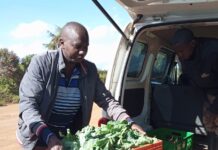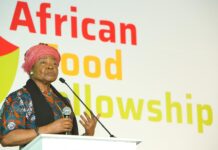By VSF Germany
Increased and protracted drought has weakened copying mechanisms for people in ASAL areas of northern Kenya. This has evidenced significant influence on livelihood options. In Ol-Turot village of Mt. Kulal location, pastoralists only sold livestock to meet basic needs, and not for profit. Due to cultural attachment, people couldn’t see the financial representation their animals had. Low investment in the livestock sub-sector due to harsh environmental conditions has undermined efforts to attract pastoralists into expanding livestock marketing as a means of trade. This, if adopted, would be a venue of selling their livestock during the dry season to mitigate the impact of drought on their livelihood assets. With no established area where buyers from other regionscould come and trade, people of Ol-Turot village were hardly interested in livestock marketing. The only structure available was small and soon the villagers resigned to their state.
VSF Germany through funding from European Union’s Strengthening the Horn of Africa’s Resilience (SHARE) Programme is supportingmarketing of livestock and livestock products with an aim of increasing productivity and commercialization which are perceived as a business. In collaboration with the livestock department of Marsabit county, VSF Germany has constructed Ol-Turot livestock market, empowering pastoralists to form groups- commonly referred to as Livestock Marketing Associations and linking of these groups to markets such as Arapal, Kargi, Laisamis, Merille, Illaut, Arge and Jirime in Marsabit town. This has led to an increase in local off-take of livestock. Ol-Turot livestock market has also attracted other income generating activities in the area such as wholesale of maize flour, sugar, and clothes. Women are also able to sell tea and other products to people during market days from the stalls constructed.
Ado Munyette, a 28 year old mother of three, was involved during construction of the livestock market as a day time guard earning KES500 a day. She saved her earning to raise capital for running a food kiosk during the first market day.
‘I was part of the team involved during construction of the livestock market by VSF Germany, working as a day time guard. Through my daily earning of KES 500/day I saved and raised capital to start this business. I am excited since there is an opportunity to have market days and get traders from different areas like Kargi, Arapal and Merille. From this job, Ihave been able to buy a mattress and other items which I could not afford before.This market has given me a chance to sell my goods and in return I get money to contribute to taking my children to school and buy household items’
Fadhayo Burcha, 36 year old herder and livestock trader expressed his appreciation for the work done by VSFG,
‘Previously we would have to travel very far to sell our cattle. We had to walk about 72kms just to get to an established market to sell our livestock. It was disheartening and exhausting. I am glad now that I can sell my livestock close by and sort my issues on time.I think we would do even better if VSF Germany builds our capacity to run this market as community. Access to the Livestock Enterprise Fund would help us to be in a position to up-scale livestock trade and increaseour ability to buy livestock during market days here in Ol-Turot and be able to participate in other neighboring livestock markets in Marsabit county’.














